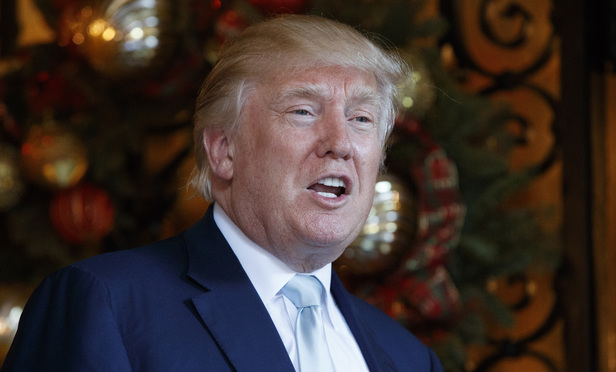 President-elect Donald Trump. (Photo: Evan Vucci/AP)
President-elect Donald Trump. (Photo: Evan Vucci/AP)
Even before a trio of prominent law professors officially filed a lawsuit against President Donald Trump over payments to his various businesses by foreign governments, several fellow academics said the suit has a fundamental problem.
Filing on behalf of the liberal watchdog group Citizens for Responsibility and Ethics in Washington (CREW) are University of California, Irvine School of Law dean Erwin Chemerinsky, Harvard Law School professor Laurence Tribe, and Fordham University School of Law professor Zephyr Teachout.
The suit, filed Monday, centers on the rarely invoked Foreign Emoluments Clause and alleges that payments from foreign governments to Trump’s hotels and other businesses violate that clause, which bars the federal government from receiving gifts or compensation from foreign governments without congressional approval.
But CREW faces an uphill battle to establish standing to sue, according to a number of law professors skeptical of the suit. The suit claims standing because CREW’s focus on Trump’s alleged violations of the Emoluments Clause is draining resources away from the group’s other activities. But the more than 30-year-old case CREW cites to establish standing, Havens Realty v. Coleman, isn’t analogous and included various factual twists not present in CREW’s lawsuit, wrote South Texas College of Law in Houston and Constitutional law expert Josh Blackman on his blog.
Additionally, the majority opinions from a pair of more recent cases related to standing ignored Havens, Blackman noted.
“There is every reason for the courts to stay away from this issue,” he wrote.
Meanwhile, Derek Muller, a professor at Pepperdine University School of Law, concluded from reading Chemerinsky and Tribe’s own constitutional law and federal jurisdiction texts that CREW lacks standing. Both texts cite the emoluments case Ex Parte Levitt, in which the U.S. Supreme Court ruled that the plaintiff needed more than a “general interest common to all members of the public.”
“These hornbook examples from professors Chemerinsky and Tribe demonstrate the high likelihood that this case will be dismissed,” Muller wrote on his blog Excess of Democracy. “Simply put, there’s nothing that distinguishes CREW from an ordinary citizen — there’s no particularized injury, and their injury is simply a generalized grievance that the public at large shares.”
Meanwhile, Case Western Reserve University School of Law professor Jonathan Adler took to Twitter to throw cold water onto CREW’s suit, calling the group’s standing claim “quite a stretch.”
“After reading [the lawsuit] am exceedingly underwhelmed, even after discounting for my starting skepticism. Hard to take it seriously,” Adler tweeted.
Among the violations alleged in CREW’s suit are Trump’s financial gain from leases held by foreign governments for space in Trump Tower; foreign governments and diplomats booking rooms in Trump’s Washington hotel; and payments from foreign government-owned televisions stations that rebroadcast “The Apprentice” and its oversees spinoffs.
“As a direct result of defendant’s purposeful refusal to acknowledge that he is submerged in conflicts of interest and his purposeful refusal to take precautions necessary to avoid those conflicts, defendant is now committing and is poised to continue to commit many violations of the Foreign Emoluments Clause,” reads CREW’s complaint, filed in the U.S. District Court for the Southern District of New York.
Contact Karen Sloan at [email protected]. On Twitter: @KarenSloanNLJ




